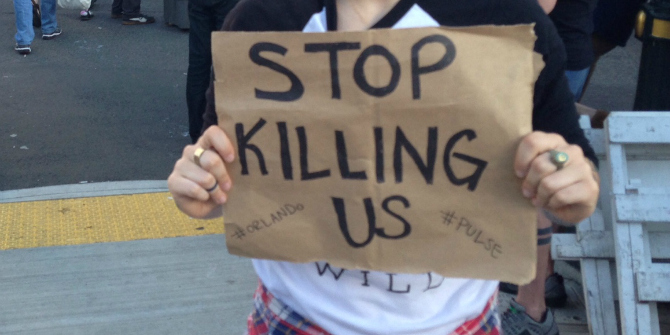 Sunday saw the worst mass shooting in US history, with a gunman murdering 49 people in a nightclub in Orlando, Florida, and injuring many others. Sierra Smucker, visiting research student at the US Centre, writes on why we should not expect any gun policy changes following shooting. She does, however, suggest that if leaders in the gun control movement are able to form a coalition with those in the LGBTQ movement, together they may be able to overcome the pro-gun lobby.
Sunday saw the worst mass shooting in US history, with a gunman murdering 49 people in a nightclub in Orlando, Florida, and injuring many others. Sierra Smucker, visiting research student at the US Centre, writes on why we should not expect any gun policy changes following shooting. She does, however, suggest that if leaders in the gun control movement are able to form a coalition with those in the LGBTQ movement, together they may be able to overcome the pro-gun lobby.
In the early hours of the morning on June 12th, a man carried out an attack on gay Americans in a Florida nightclub with an assault rifle that he legally bought, killing 49 and injuring at least 53. Only 13 years ago, this mass casualty weapon would have been illegal to purchase. In 1994, then President Bill Clinton signed the Federal Assault Weapons Ban as part of the Violent Crime Control and Law Enforcement Act. This policy banned the manufacture for civilian use of certain semi-automatic firearms it defined as assault weapons, as well as certain ammunition magazines it defined as “large capacity.”
The passage of this bill was prompted by the murder of 5 children in Stockton California by a man with a semi-automatic AK-47 rifle. Such a bill would certainly have made it more difficult for the gunman who murdered many in a matter of hours in Orlando to do so. In the wake of yet another mass shooting with an assault weapon, it may seem impossible to believe that Congress allowed this bill to ‘sunset,’ refusing to renew the legislation.
How did we get here?
The National Rifle Association and its motivated supporters lobbied for Congress to end the assault weapons ban in 2004 and won. Since then, the organization has exalted the virtues of weapons like the AR-15. It has become “America’s Most Popular Rifle” with more than 3 million in circulation. The same weapon was used in October, when Chris Harper-Mercer killed 9 people at Umpqua Community College in Oregon and in December last year when Syed Farook and Tashfeen Malik opened fire with one at a social services center in San Bernardino, California, killing 14 people.
But Americans rarely decide gun policy by neutrally assessing the effectiveness of firearms regulations. Despite the fact that more Americans die every year from gun violence than any other economically advanced country, small changes in terms of policy and some existing policies, like the assault weapon ban, are constantly under threat.
Many point to the Second Amendment – which provides the right of the people to keep and bear arms – to explain this political inaction. Yet, the reason for America’s pro-gun policies lies more in politics than in constitutional law. American gun owners are a politically engaged group that is well funded and wields considerable influence in the political arena. In contrast, those in favor of gun control have historically failed to undermine gun rights supporters due to a lack of a dedicated membership, stable funding sources, and political savvy.
Credit: Sarah Mirk (Flickr, CC-BY-NC-2.0)
Will anything change?
Given the history of the gun-rights vs. gun-control battle, we should expect no policy change following the worst mass shooting in the history of the United States. If the aftermath of this mass killing follows the pattern of others, we will see an explosion of public outcry, political grandstanding and promise making, but little real policy change at the federal level. The investment of gun-rights activists will remain high, with more buying guns than before, while gun-control activists will resume their focus on another issue that is more important to them than gun-control. In other words, it is not the fact that we do not have support for a gun-control movement that prevents change in firearm regulation, it is the difference in the intensity of support between gun-rights and gun-control activists that paves the way for pro-gun regulation instead of gun-control.
But this time might be different for two reasons. First, the gun-control movement is better prepared. In the last several years, leaders of the gun control movement like Everytown for Gun Safety, Americans for Responsible Solutions, the Joyce Foundation, the Open Society Foundations, and the Law Center to Prevent Gun Violence have begun to shore up financial capital and claim a number of important political victories. Some of these changes can be traced back to the mass shooting at Sandy Hook Elementary School in Connecticut in 2012. New funding from major donors like New York City Mayor Michael Bloomberg and Texas attorney Steve Mostyn provided an injection of capital that gun control organizations historically lacked, giving them the opportunity to compete with the NRA dollar-for-dollar. The emotional aspects of the Sandy Hook shooting prompted the establishment of organizations like Moms Demand Action and the engagement of groups like MomsRising and Women’s Donor Network, reenergizing the historic link between women’s organizations and gun control in the United States.
Second, there may be an opportunity for cross-movement collaboration. My research suggests that while the landscape is not changing quickly, incremental changes are possible when the gun-control movement can link with another strong social movement. The women’s movement has proven to be a particularly powerful ally for the gun-control movement who has suffered from less active grassroots supporters than the gun-rights movement. By collaborating with feminist advocates, particular those focused on domestic violence, gun-control groups have gained ground in historically hostile states like South Carolina, Louisiana, and even Alabama. These laws specifically prevents those with convictions related to domestic violence from obtaining firearms.
In the next few weeks, it will be critical for leaders in the gun-control movement to link with those in the movement for LGBTQ rights which has correctly interpreted this event as a hate crime against the community. Together, the two groups have an excellent chance of decreasing the casualty rate of the next (and there will be another) mass shooting. Political coalitions are powerful and such a powerful coalition is necessary to overcome one of the most influential interest groups in American history.
Please read our comments policy before commenting.
Note: This article gives the views of the author, and not the position of USAPP – American Politics and Policy, nor the London School of Economics.
Shortened URL for this post: http://bit.ly/1ZNoNEX
_________________________________
 Sierra Smucker – Duke University
Sierra Smucker – Duke University
Sierra Smucker is a PhD student at Duke University’s Sanford School of Public Policy, and a Visiting Research Student the LSE US Centre. Her research, work, and teaching explore the ways in which less-advantaged groups gain access to political power and influence in important policy debates. Focusing on the role of social movements and the political feedback effects of policy making, Smucker looks at the politics of the policy process and how the state can influence who has access to power. She has particular expertise in the politics of gun reform in the United States and policy addressing violence against women.







